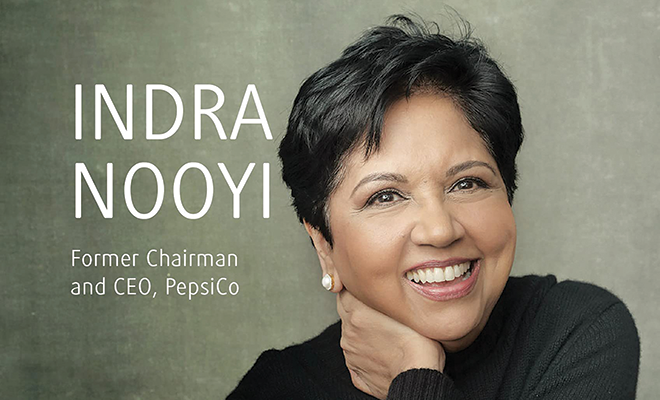
My Life in Full: Work, Family, and Our future by Indra Nooyi
Indra Nooyi was CEO and chairman of Pepsico, the largest snack and beverage company in the world, from 2006 to 2019. When she retired, she thought she would write a book about how to mix work and family. This is not that book.
Nooyi discovered that the topic of women and work conflict had been investigated at every level, all over the world. Instead, she wrote a beautiful memoir about how a woman, a person of color and an immigrant rose to become the CEO of Pepsico by living her life to the fullest.
My Life in Full: Work, Family, and Our Future begins with Nooyi talking about her childhood in India in a traditional, middle-class family. Her paternal grandfather was a retired judge. Her parents lived in her grandfather’s house with many members of the extended family. As members of the Hindu Bahamian caste, they were devout and focused on education. Nooyi’s grandfather frequently called to her as she returned from school, asking what she had studied. He always had her read to him in English, frequently from articles he had already read, she suspected. Words she didn’t understand were looked up in either the Oxford English Dictionary or the Cambridge Dictionary, ever-present in the house.
When she graduated high school at 15, Nooyi began studying at a coed Christian college; after graduating, she entered a post-graduate university, Indian Institutes of Management, affiliated with Harvard. Tens of thousands of students applied for 150 places each term. Indra’s older sister, Chandrika, an excellent student, was admitted, but their mother declared that she couldn’t go unless she was married. In India in the 1970s, girls simply didn’t go to coed colleges nearly 1,100 miles from home. When Indra graduated a few years later, it was a nonevent for her to apply to a university in Calcutta, 1,000 miles from her home.
The core of the book is her arrival as an immigrant and post-graduate student at Yale University’s new business school in New Haven, Connecticut, followed by her career development. During her time at Yale, Indra felt appreciated for her intellect and hard work ethic, but she was an outsider socially. Her brutally honest telling of her first interviews for a summer job will horrify, yet she got the job!
After her first year at Yale, she took a summer internship in Chicago, where she met her husband, Raj. At the end of summer, the pair separated, Indra continuing her studies in New Haven and Raj working in Chicago. By the end of her second year at Yale, Indra accepted a job with a consulting firm in Chicago. The couple was married that summer with her family coming from India for the graduation ceremony and later wedding.
Indra details her career path, but for most women, the question is, how did she do it? There was a lot of support from her husband, Raj, and many mentors along the way. During her early years at BCG, the consulting firm she worked for in Chicago, Indra’s father became ill with pancreatic cancer. BCG’s CEO called to offer her up to six months paid leave to attend to her father. She says, “This episode in my life underscores how paid leave to get through all kinds of personal situations, including childbirth and personal illness but also other circumstances, can be a game changer for so many careers. In many ways, it’s only when you have experienced this benefit yourself can you truly realize its critical importance.”
Don’t think that because this isn’t a book on the conflicts of working motherhood that Nooyi did not experience these conflicts. For much of her first daughter’s life, Indra had the support of her mother and other members of her extended family on both sides. Yet, there were times when no one was available, and the young couple struggled with childcare as other working couples do. She says, “The travails of working parents who do this dance every day for years, through snowstorms but also through job loss, divorce, illness and the millions of other hurdles we all face, make me wonder why accessible, affordable quality childcare isn’t a national priority.”
Throughout her career, Indra felt the sting of bias about her color and ethnicity. Nevertheless, she has made diversity and inclusion a priority in the workplace wherever she could. She believes that diversity and inclusion are here to stay and corporate leaders need to get used to the concept as major business drivers. Furthermore, she says, “We don’t tolerate negative, discriminating behavior against our daughters or sisters or wives. Why do we allow it in the workplace, directed at women who are daughters and sisters themselves?” On many other workplace topics, she is equally vocal. The book is thoughtful and full of insights of a woman who’s been there, done that. ®







